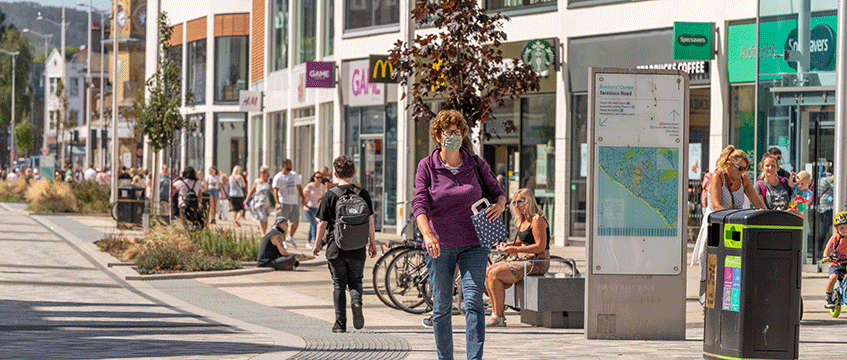COMMENT After an extraordinary period in which non-essential retail was forced to close its doors for months at a time, it’s estimated the UK currently has excess retail space of around 40%. Despite some positive 2021 sales, it’s unlikely that big retail will rush back to the high street, if it returns at all.
Neither communities nor the developers that own and manage high street retail space want to see town centres empty – communities want vibrant, healthy high streets that meet their needs, and developers want retail space filled by successful businesses.
We therefore need a new vision and a new approach if we are to ensure our high streets and town centres are resilient and fit for purpose. Our recent report, A High Street Revolution: How private developers can support the community takeover of our town centres, from the London School of Economics and Political Science, highlighted a solution – greater collaboration between private developers and the communities they operate in.
From empty unit to incubator
From Hebden Bridge to Bodmin, our research has shown that where communities are able to play an active role on the high street through socially trading organisations such as community businesses, they bring a vibrancy and resilience to the town centre ecosystem that extends to other private businesses surrounding them.
However, they face a range of challenges – from long- and short-term access to space and complex legal arrangements to rents that feel unrealistic. These challenges prevent community businesses from flourishing, and that’s where developers can step in and play a vital role in helping to revive town centres. It’s a win-win situation that will have positive outcomes not just for local people but also for the success and viability of developers’ own assets.
As owners of the largest share of property on the high street, traditional property companies and real estate investment trusts are in a key position to help communities fill the gaps left behind on high streets and fill these spaces with the services that local people want and need. By offering social leases and turnover-linked rents, they can ensure empty units are in use and help incubate fledgling businesses that could later go on to be market-rate paying tenants.
Many private developers, REITs and high street property owners can – and want to – develop more community-oriented models. Private property investors such as Legal & General, Ellandi and New River REIT are already taking a more active role in how they create places that are relevant to communities, looking to use their retail and shopping centres differently to support a more vibrant mix of uses and tenants. But more needs to be done, including flexible leases for community businesses, meanwhile uses for space and the creation of community hubs in shopping centres.
Diversity of visitors
Of course, the government and local authorities need to play their part in the reimagining of the high street. Community businesses often don’t have access to local government and decision-making, suffering as a result of the fragmented ownership of high street properties, prohibitively high rents and property prices. While we do need better governance models and greater clarity on property ownership, private property owners and private developers can work with community businesses to help our high streets thrive again.
The desire to find solutions for our town centres in both the private sector and community groups is exemplified by the recent first meeting of Platform. The group, led by community entrepreneur Rebecca Trevalyan, includes leading private sector partners, as well as local government and leaders representing community businesses from across the UK. Platform recognises that to bring change to our high streets we need real collaboration, with communities placed at the heart of the work. The desire to place communities at the centre of high street development has recently gained government recognition – in the new high streets strategy the government said communities should be at the heart of every high street and funding decision.
To ensure our high streets continue to go from strength to strength we need developers, REITs and property owners to work with their local communities. If the private sector steps up and provides space or leases for community businesses and community-led projects, we will see increased footfall and diversity of visitors to our town centres. This will not only benefit local people through creation of jobs and by providing community hubs in which to socialise but will contribute to the wider health and resilience of high streets and town centres, benefiting the private sector too.
Nick Plumb is high streets lead at Power to Change











